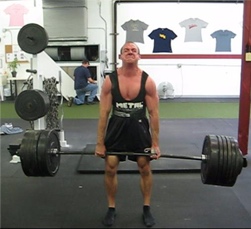Cricket: Training for Speed-Strength
Written on May 28, 2007 at 11:44 am, by Eric Cressey
Q: Cricket is essentially a “speed-strength” based game – hitting, throwing and running. However, it requires players to play for long periods – anything between 2-6 hours a day. How can players include these opposing factors in their training?
A: One of the things you always have to concede with any sport is that you’re always going to be riding a few horses with one saddle. Ironman competitors will never squat 500 with their aerobic training stimuli, and powerlifters won’t compete in Ironman events because training to do so would interfere with their strength gains. All other sports fall somewhere in the middle between these extremes.??From a general standpoint, you train to become more efficient as an athlete. First, you have to do so biomechanically by ironing out muscle imbalances. You need to be a better athlete before you can be a better cricket player. So, mobility and activation work, soft-tissue quality initiatives, and appropriate resistance training is key to success on this front.??Next, you have to be efficient in the context of your sporting movements – and that’s where tactical work comes in.??What you’re referring to with this question is one-third of the efficiency equation: metabolic efficiency. The more aerobic a sport, the sooner you’ll need to prioritize intensive metabolic conditioning in the off-season period. So, a soccer player would require it sooner than a football player. I go into great detail on this in The Ultimate Off-Season Training Manual.??Cricket is a bit of middle-ground, though. From a duration standpoint, it’s clearly a long event at times. However, it isn’t necessarily continuous; it’s more along the lines of what you see in baseball – which is basically a completely anaerobic sport. You sprint, stand around for an extended period, and sprint again – possibly even 30-60 minutes later! Just because the matches/games last 4-5 hours doesn’t mean that they’re aerobic – or that you need to train for them with repeated bouts of high-intensity exercise with INCOMPLETE rest.??My suggestion is to do what it takes to be fast and powerful – and let the duration of the matches just fall into place. Attend to nutrition/hydration and recovery protocols well, and the physical qualities you’ve built will sustain themselves in spite of the duration of the match. And, if you’re crazy athletic, chances are that you’ll win those matches a lot sooner.
Eric Cressey
Get your Questions Answered.
Don’t Make The Same Mistakes as your Competition. Utilize Your Off-Season.
Category Blog | Tags: Building The Efficient Athlete, Magnificent Mobility, Mobility, Off-Season, Rotator Cuff Exercises, Rotator Cuff Rehab, Shoulder Exercises, Shoulder Health, Shoulder Impingement, Shoulder Pain, Shoulder Rehab, Strength, Training, Unstable Surface Training, Weight Lifting Program, Weight Lifting Routine, Workout Program, Workout Routine
|










